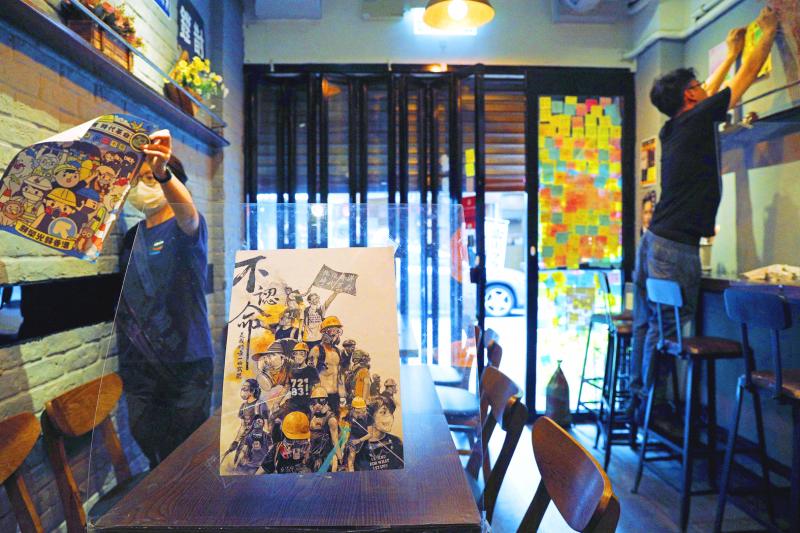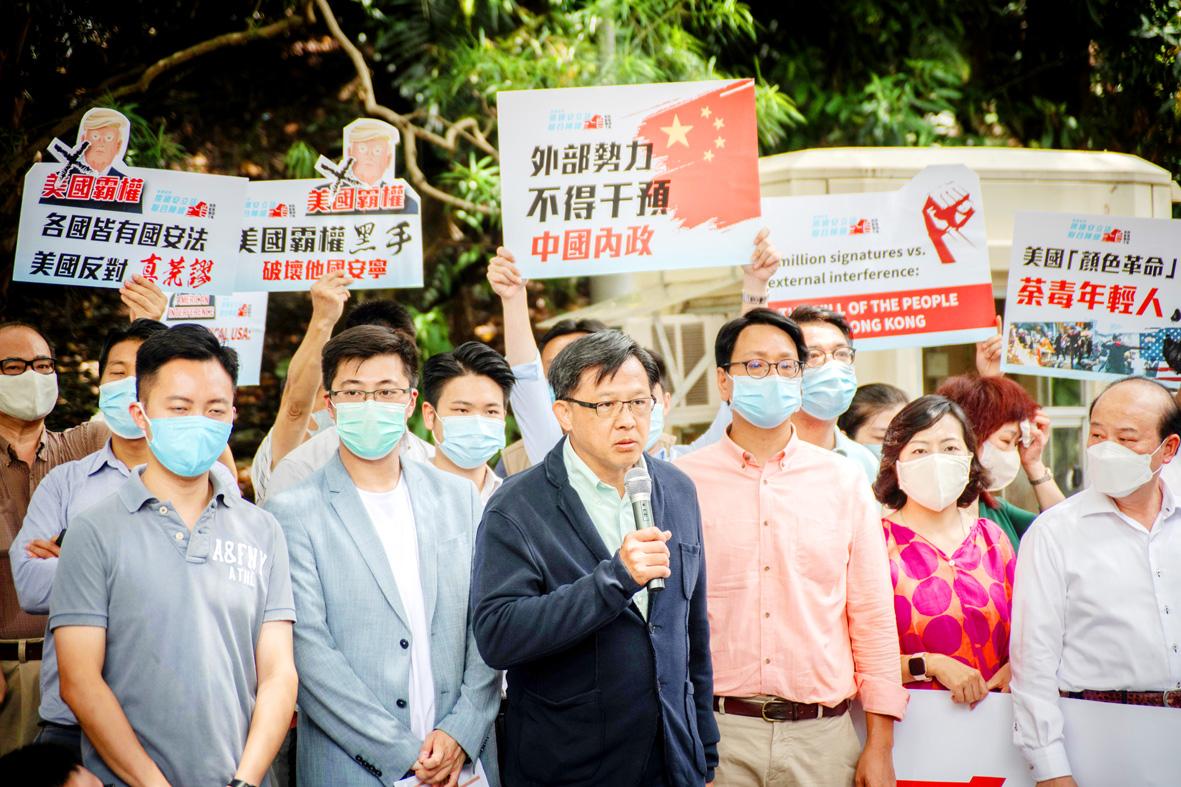Taiwanese should avoid unnecessary visits to or transit through Hong Kong, Macau or China after the passing of “outrageous” national security legislation for the former British colony, Mainland Affairs Council (MAC) Deputy Minister Chiu Chui-cheng (邱垂正) said yesterday.
Speaking to reporters in Taipei, Chiu said the legislation was “the most outrageous in history” with a reach that extended everywhere.
However, the Taipei Economic and Cultural Office in Hong Kong would continue to operate, he said.

Photo: AP
“We would not take the initiative to withdraw it, unless there are external factors,” he said. “We would stay until the last minute.”
In related news, the Chinese government and pro-Beijing activists in Hong Kong condemned what they called foreign meddling in the territory’s affairs, as more countries moved to offer Hong Kongers refuge and impose sanctions on Beijing over the new legislation.
Chinese Ministry of Foreign Affairs spokesman Zhao Lijian (趙立堅) said no amount of pressure from external forces could “shake China’s determination and will to safeguard national sovereignty and Hong Kong’s prosperity and stability.”

Photo: Bloomberg
He urged the US to stop interfering in Hong Kong’s affairs, and not sign a sanction bill into law, referring to the US House of Representatives approval on Wednesday of a bill rebuking China over its crackdown in the territory.
If the bill becomes law, “China will definitely take strong countermeasures, and all consequences will be borne by the US side,” he said.
The Chinese embassy in London said that Britain’s offer to extend residency rights to up to 3 million Hong Kongers eligible for British National Overseas passports would be in breach of “international law and basic norms governing international relations.”
“We firmly oppose this and reserve the right to take corresponding measures,” it said in a statement, without elaborating.
Australian Prime Minister Scott Morrison yesterday said his government is also considering a move to provide a “safe haven” to Hong Kongers.
Dozens of pro-Beijing advocates and lawmakers protested outside the US consulate in Hong Kong to demand that the US stop meddling.
They said they had gathered 1.6 million signatures online in support of its call.
Tam Yiu-chung (譚耀宗), Hong Kong’s sole delegate to the National People’s Congress Standing Committee, told Radio Television Hong Kong that the new legislation was not harsh.
“If it were, no one would dare violate it,” he said.
Meanwhile, Hong Kong Chief Justice Geoffrey Ma (馬道立) said that judges appointed to cases under the new legislation would be appointed on the basis of judicial and professional qualities, not politics.
In a rare statement, Ma said assigning judges to cases would be the sole responsibility of the judiciary, apparently seeking to allay fears that judges for national security cases would be picked by Hong Kong Chief Executive Carrie Lam (林鄭月娥).
“Judges of foreign nationality are not excluded. They are expressly permitted to be appointed as judges in Hong Kong,” Ma said.
However, the Bar Association said the legislation undermines the territory’s independent judiciary and stifles freedoms.
In a five-page analysis, the association said that the new national security offences “are capable of being applied in a manner that is arbitrary, and that disproportionately interferes with fundamental rights, including the freedom of conscience, expression and assembly.”

The CIA has a message for Chinese government officials worried about their place in Chinese President Xi Jinping’s (習近平) government: Come work with us. The agency released two Mandarin-language videos on social media on Thursday inviting disgruntled officials to contact the CIA. The recruitment videos posted on YouTube and X racked up more than 5 million views combined in their first day. The outreach comes as CIA Director John Ratcliffe has vowed to boost the agency’s use of intelligence from human sources and its focus on China, which has recently targeted US officials with its own espionage operations. The videos are “aimed at

STEADFAST FRIEND: The bills encourage increased Taiwan-US engagement and address China’s distortion of UN Resolution 2758 to isolate Taiwan internationally The Presidential Office yesterday thanked the US House of Representatives for unanimously passing two Taiwan-related bills highlighting its solid support for Taiwan’s democracy and global participation, and for deepening bilateral relations. One of the bills, the Taiwan Assurance Implementation Act, requires the US Department of State to periodically review its guidelines for engagement with Taiwan, and report to the US Congress on the guidelines and plans to lift self-imposed limitations on US-Taiwan engagement. The other bill is the Taiwan International Solidarity Act, which clarifies that UN Resolution 2758 does not address the issue of the representation of Taiwan or its people in

US Indo-Pacific Commander Admiral Samuel Paparo on Friday expressed concern over the rate at which China is diversifying its military exercises, the Financial Times (FT) reported on Saturday. “The rates of change on the depth and breadth of their exercises is the one non-linear effect that I’ve seen in the last year that wakes me up at night or keeps me up at night,” Paparo was quoted by FT as saying while attending the annual Sedona Forum at the McCain Institute in Arizona. Paparo also expressed concern over the speed with which China was expanding its military. While the US

SHIFT: Taiwan’s better-than-expected first-quarter GDP and signs of weakness in the US have driven global capital back to emerging markets, the central bank head said The central bank yesterday blamed market speculation for the steep rise in the local currency, and urged exporters and financial institutions to stay calm and stop panic sell-offs to avoid hurting their own profitability. The nation’s top monetary policymaker said that it would step in, if necessary, to maintain order and stability in the foreign exchange market. The remarks came as the NT dollar yesterday closed up NT$0.919 to NT$30.145 against the US dollar in Taipei trading, after rising as high as NT$29.59 in intraday trading. The local currency has surged 5.85 percent against the greenback over the past two sessions, central